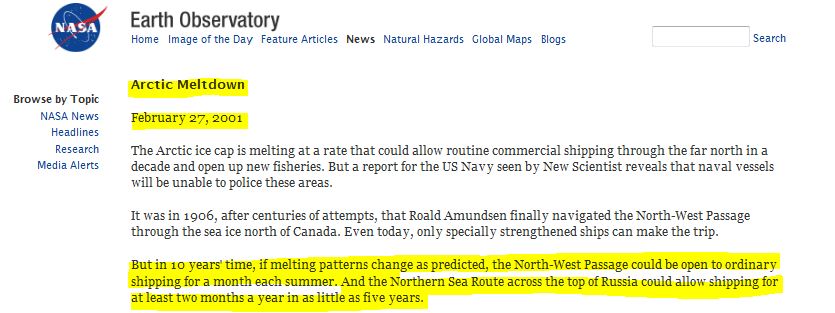And they said that the Arctic was melting faster than expected ……..
h/t to Marc Morano
http://earthobservatory.nasa.gov/Newsroom/view.php?id=22250
Arctic Meltdown
February 27, 2001
The Arctic ice cap is melting at a rate that could allow routine commercial shipping through the far north in a decade and open up new fisheries. But a report for the US Navy seen by New Scientist reveals that naval vessels will be unable to police these areas.
It was in 1906, after centuries of attempts, that Roald Amundsen finally navigated the North-West Passage through the sea ice north of Canada. Even today, only specially strengthened ships can make the trip.
But in 10 years’ time, if melting patterns change as predicted, the North-West Passage could be open to ordinary shipping for a month each summer. And the Northern Sea Route across the top of Russia could allow shipping for at least two months a year in as little as five years.
The new routes will slash the distances for voyages between Europe and East Asia by a third, and open up new fisheries. The resulting boom in shipping could lead to conflicts, as nations try to enforce fisheries rules, prevent smuggling and piracy, and protect the Arctic environment from oil spills. To complicate matters, Russia and Canada consider their northern sea routes as national territory, while the US regards them as international waters.
These predictions come in a recently declassified report of a meeting of American, British and Canadian Arctic and naval experts in April last year, organised by Dennis Conlon of the US Office of Naval Research in Arlington, Virginia. Entitled Naval Operations in an Ice-Free Arctic, the report reveals that standard naval operations could be close to impossible in Arctic waters. The biggest problem is that communications satellites do not cover the area well, says Conlon.
Modern ships and weapons rely on various kinds of sensors but none work well in Arctic conditions, he adds. Ice complicates the way sound travels through water, making sonar and acoustic monitoring difficult. Icy decks and high winds make it extremely difficult for aircraft to operate. Unbroken summer daylight makes covert operations harder.
The US and the Soviet Union invested heavily in Arctic research throughout the cold war, because it was a place where submarines could hide under the ice, ready to surface and launch nuclear missiles. But that research has stopped and no new work is planned.
Peter Wadhams of the Scott Polar Research Institute in Cambridge agrees that the Arctic could soon open up. “Within a decade we can expect regular summer trade there,”he predicts.



This is proof of what linear thinking get you in climate science — the wrong answer. Even the most ignorant of scientists surely cannot believe, with all of the evidence available of the past climate history, that because the temperature goes in one direction that it will always continue in that direction. One would have to a *&%$#*& idiot to take that stand. The facts just don’t support linear thinking in “climate science”. If the climate moved in a linear direction it would never change and the evidence says different.
I don’t think they worry much about evidence. In fact, I think a lot of these climate scientists have given up the notion of evidential and observation based science completely. They’ve moved to a computer-based method of “doing science” and apparently have decided that whatever the machine spits out is the honest truth. They totally forget the simple concept of GIGO.
As you can see global warming predictions always come true.
Hey wait they said COULD… it’s always COULD and MAY… CYA tactical usuage.
Why has this failed to hit the mainstream media? They can’t report on the predictions without following up on the outcome!